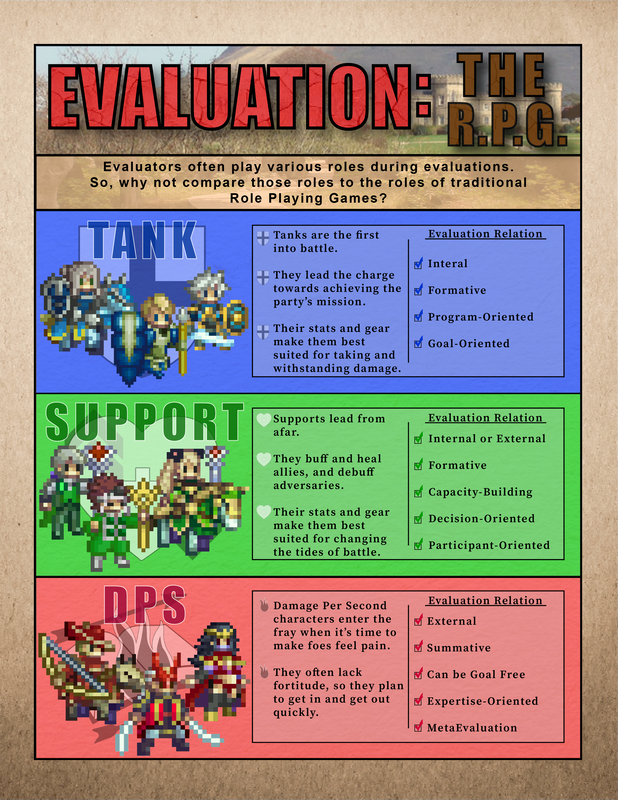|
For my Advanced Evaluation in Education course, we were assigned to create a mind map or presentation of some kind that communicates our understanding of evaluation and its intricacies. For my project, I chose to design an infographic that illustrates a metaphor comparing the roles that evaluators play to the roles in a traditional role playing game (be it video game or table top). When I began the project, it was overly ambitious. I had determined that I was going to include several sub-classes for each of the RPG roles, i.e. Tank, Support, and Damage per Second (DPS). I brainstormed that Tanks would be further divided into Warrior, Knight/Paladin, and Dark Knight. For Supports I was trying to decide how I would divide the different support roles and what labels I would use. I came up with three different categories of Support characters: (1) White Mage/Healer/Cleric/Priest, (2) Troubadour/Priest/Bard/Songstress, and (3) Tactician/Scholar/Sage/Strategist. I faced a similar problem with DPS trying to choose between: (1) Archer/Hunter/Ranger, Black Mage/Wizard, and Monk/Rogue/Mercenary. As I began to detail each of the sub-classes, I realized that I was going to end up with lots of overlap (which usually exists in RPGs anyway), and that I was too focused on creating RPG classes instead of making comparisons to evaluation. Thus, I decided to only including the three basic categories of roles, and focus on my comparisons within them.
Despite concluding this project for now, there is more that I would like to do. I limited myself to an artboard that was 8.5 inches by 11 inches, so it would fit on copy paper. I would like to enlarge the artboard so I could add more content. I would like to provide more details about each evaluation method as a rationale for why I placed them where I did, e.g., explaining why I think Tank characters are formative and internal as opposed to summative and external like DPS characters. I also would have liked to list famous evaluators under each class. For example, I would have liked to add a section to the Tank category called TOP TANKS that listed evaluators like Tyler, Provus, and Weiss; a section for SUPPORTS called SUPER SUPPORTS that listed evaluators like Stufflebeam, Alkin, Guba, and Lincoln; and a section under DPS called DISTINGUISHED DPS featuring names such as Scriven, Eisner, and Accreditation “Guilds.” If I had more time, I would love to create a larger poster with more evaluation details, and more recognition for leading evaluators. Since I was unable to share my rationales on my infographic, I decided that I would share them here. In RPGs, Tank characters initiate battles and are the first into the fray. For these reasons, I related them to internal evaluators who complete formative evaluations. Tanks also tend to focus on objectives so they know where to lead their party. This focus on goals makes tank evaluators most suited for program and goal-oriented evaluations. Support characters tend to be the party tacticians. Supports help the rest of the party choose which actions to take based on the ways in which their support abilities can turn the tides of battle. The decision making aspect of the support’s role makes them understandably well suited for decision-oriented evaluations. As part of providing information for making decisions, support evaluators can be external or internal, but are mostly formative in nature. Support evaluators also collaborate with party members to choose the best actions, which makes them well suited for participant-oriented evaluations and capacity building. Lastly, DPS characters are the primary damage dealers in RPGs. They usually try to stay out of the central fray, allowing tanks to take damage while they damage adversaries. Due to their fragile nature, DPS players are usually more experienced than tanks, using their knowledge to decide when to attack and when to retreat. DPS characters are also usually the characters that determine whether a battle is won or lost. Due to their experience and opportunity to influence the outcome of a battle, DPS evaluators are mostly external summative evaluators. This makes them well suited for metaevaluation and expertise-oriented evaluations. Finally, due to their expertise, DPS evaluators may sometimes approach an evaluation using a goal-free approach. I really appreciate the opportunity we were given to express how we make connections to the field of evaluation, and how those connections help us understand the field. If you would like to read more about my design process for this project, you can do so here.
0 Comments
Your comment will be posted after it is approved.
Leave a Reply. |
About
This blog presents thoughts that Cecil has concerning current projects, as well as musings that he wants to get out for future projects. For questions or comments on his posts, please go to his Contact page. Archives
April 2024
Tags
All
|

 RSS Feed
RSS Feed
